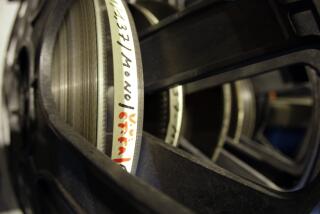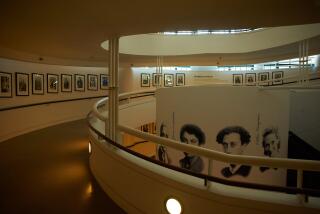MOVIE REVIEW : Restored ‘Intolerance’ Launches Festival of Preservation
- Share via
To launch its third annual Festival of Preservation, the UCLA Film and Television Archive is presenting D.W. Griffith’s 1916 “Intolerance” tonight and Saturday at 7:30 p.m. in Royce Hall. The film was restored over an eight-year period under the direction of Peter Williamson, film conservator of the Museum of Modern Art. For this landmark occasion, Dennis James will perform his own score on Royce Hall’s 1934 Skinner Organ.
There has never been a movie quite like “Intolerance,” and few, if any, have been so influential. (Its impact can be traced in the films of Cecil B. DeMille as well as Sergei Eisenstein.) Its vast re-creation of the open court of King Belshazzar with its rows of soaring columns, topped by elephants with upraised trunks, is the most familiar set of the entire silent era and remains emblematic of the barbaric grandeur of the early screen spectacles.
“The Birth of a Nation” (1915) and “Intolerance” marked the coming of age of film as an art form, with Griffith emerging as the pre-eminent master of the screen narrative, either inventing or bringing to full flower the language of the cinema itself.
Ironically, “Intolerance” began modestly as “The Mother and the Law,” a melodrama protesting the plight of a poor young couple (Mae Marsh, Robert Harron) and their struggle to obtain simple justice in the face of adversity and interfering, hypocritical do-gooders. At some point--probably after seeing Giovanni Pastrone’s “Cabiria” (1914), a clear inspiration for the film’s Babylonian sequence--Griffith decided to expand his theme to trace the evils of intolerance through the ages, cross-cutting between the Fall of Babylon, the crucifixion of Christ, the St. Bartholomew’s Day Massacre of the French Huguenots and his original modern story.
As each of the four stories reaches its climax, Griffith quickens the pace of his cross-cutting, creating an avalanche of images that has led to the frequent description of “Intolerance” as a “film fugue.” Linking the stories is the repeated maternal image of Lillian Gish seated before a cradle that is endlessly rocking.
Pieced together from bits of film collected from sources around the world and assembled with the original score as a guide, “Intolerance” emerges with greater clarity and depth than it has possessed in decades. Brief missing sections have been filled in with stills, much in the manner of the restoration of the 1954 “A Star Is Born”; this “freeze frame” effect, in fact, calls attention to Griffith’s rhythmic sense of pace and action, his instinctive flair for composition. Considering the patchwork nature of the undertaking, the fresh print is remarkably clear and even, most of it in rich sepia with some sequences tinted blue or red.
The Babylonian and modern stories still dominate, with the Christ story serving mainly as a motif and the Huguenot story now seeming considerably more substantial. If there is one dominating presence, it is certainly Mae Marsh as an adorable young woman whose natural capacity for enjoying life is constantly thwarted and whose only sin is poverty. It is her story that concludes with a classic hairbreadth chase that charges the film’s breathtaking finale.
Indeed, the film’s spectacle set-piece, the hedonistic Feast of Belshazzar with its legion of dancers on a seemingly endless broad staircase, is finally no less awe-inspiring than the play of emotion on the endlessly expressive face of Marsh. “Intolerance” may end with a fantasy expressing universal peace and happiness, but needless to say Griffith’s urgent plea for understanding between individuals and nations is timeless.
The Festival of Preservation includes a tribute to Cecil B. DeMille, which will begin next Friday with his restored “Cleopatra” (1934) starring Claudette Colbert, and a salute to the British Film Institute, which will be highlighted by a group of Michael Powell-Emeric Pressburger films.
For more information: (213) 206-8013, 206-FILM.
More to Read
Only good movies
Get the Indie Focus newsletter, Mark Olsen's weekly guide to the world of cinema.
You may occasionally receive promotional content from the Los Angeles Times.










